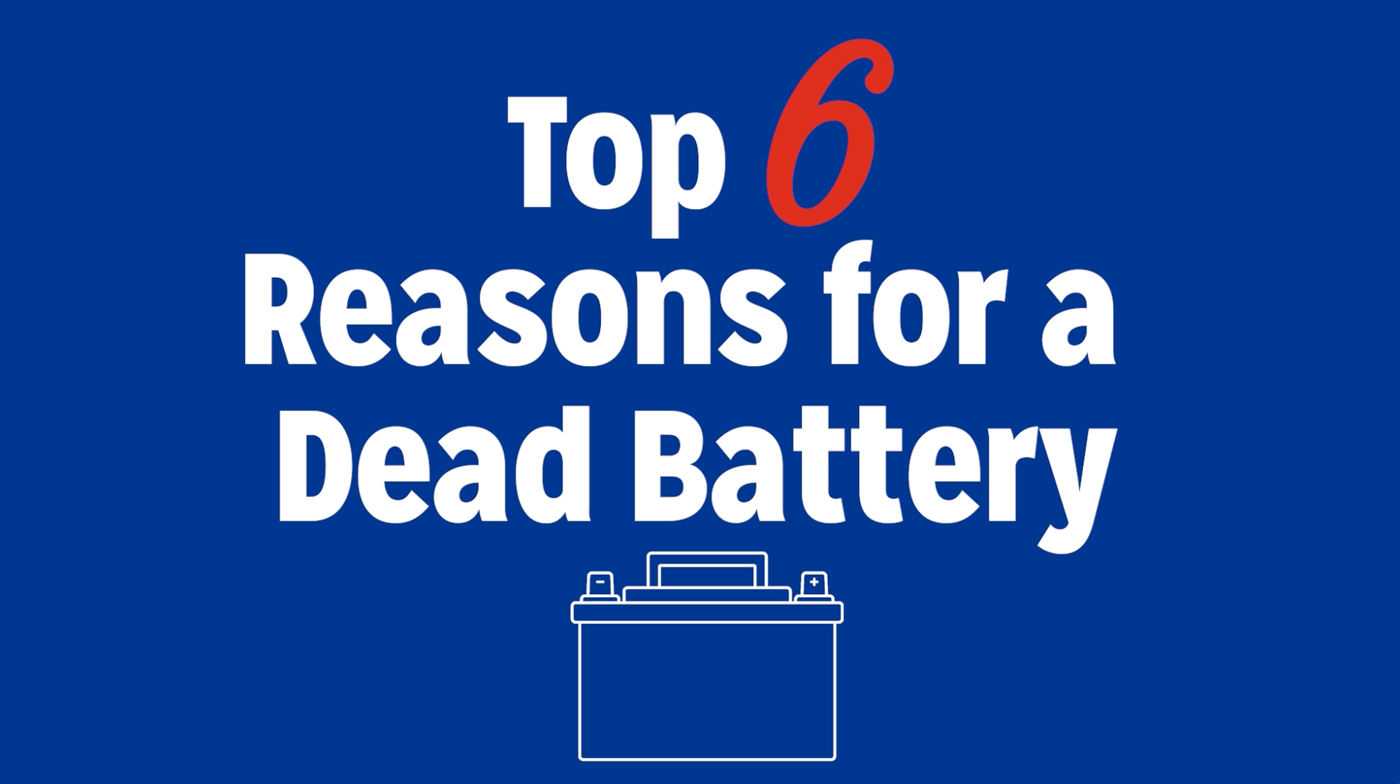To ensure you receive the best service possible,
please enter your zip code below:

When you’re ready to go but your car’s battery says “no,” there’s a sinking feeling can settle in quickly. Most of us have experienced a car battery dying at least once in our lives, and while most batteries are designed to last three to five years on average, there can be multiple reasons for a car battery to die unexpectedly.
Today, we’ll uncover the six most common causes for early or ongoing battery drain and battery depletion in both gas-powered and electric vehicles. We’ll also provide tips to help preserve the life of your battery and keep you moving through your daily life.

1. Corrosion buildup: When volatile chemicals or gases escape from small cracks around the battery terminal and come in contact with conductive metal on the battery posts, corrosion can occur. While this is a common issue, it’s also caused from lack of regular maintenance.
Major corrosion may be a sign of battery damage where repair or replacement is needed. For minor corrosion, sprinkle baking soda on the corroded area, dab with vinegar or lemon juice and scrub with a steel wire brush if necessary.
2. Extreme temperature: In extremely cold temperatures, electrons within the battery tend to slow and your battery can lose effectiveness. In high temperatures, oxidation and evaporation can take place inside the battery and bring about premature failure.
Storing your vehicle in a garage during extreme heat or cold may help prolong your battery life and prevent premature drain.

3. Too many accessories: When too many electronics and accessories are connected to your car, parasitic drain may occur. This can also happen if there’s a short in your electrical system. Even if your car is turned off, electronic accessories that remain plugged into the car can still drain the battery. Be sure to unplug optional equipment such as cell phones and chargers once your car is parked and turned off.

4. Extended sitting: “Use it or lose it” is an adage that applies to vehicle batteries in the same way it applies to our human bodies. Cars and trucks that are parked for extended periods of time or are rarely driven can experience a drained battery quickly, especially if the battery is already weak or old. Today’s vehicles have electronic systems that continue to draw power even when the engine is off which can further expedite battery drain.
Regular start-up and driving are important for the long-term health of car batteries. Consider using a trickle charger to maintain your battery’s charge on a parked vehicle. You can also disconnect the negative battery terminal to prevent parasitic draws from draining the battery; note that professional assistance from a qualified technician may be necessary to reset some of the systems afterward.

5. Battery age: Most car batteries utilize lead-acid, multi-cell batteries. Each cell is filled with a dilute solution of sulfuric acid as well as lead. As your vehicle's battery ages, it undergoes a natural process called sulfation that can prevent your car from starting. If your car's battery is between 2-5 years old, this could be the culprit, and it might be time for a replacement battery.
6. Bad alternator: Batteries use an alternator to charge while you drive. So, a common reason for a battery not holding its charge or starting for a short while only is usually due to a faulty alternator. A diagnostic check is generally required to know if your alternator is bad. If you can’t pinpoint the problem at the time of breakdown, request help online using the AAA Mobile App for AAA Roadside Assistance.
Understand the difference between a dead battery and a bad alternator?
Find out more
Car care
Don’t let a dead battery ruin your plans. AAA Mobile Battery Service will test and jump your battery or replace it at a discounted rate. AAA also offers other options to purchase and install a new battery. You can even get a free instant battery quote.
‡Offer valid through 4/30/2025. Offer valid for Classic/Basic Memberships only. Pricing valid at member join only. Offer excludes Motorcycle coverage. Payment of full AAA Membership dues is required upon renewal. Offers, terms, conditions and restrictions apply and are subject to change without notice. Not combinable with any other offer. Offer not valid in FL, GA, MI or PR. A member can add one eligible family member for free for up to one year. Additional Associates are half price. Associate memberships are available to the Primary member’s spouse, one other adult living in the household, and their children living at the same residence or away at school. Associate members must have the same type of membership as their Primary member, with the exception of Motorcycle. Associate membership expires on the renewal date of Primary member.
Upon activation and with proper identification, AAA will provide regular AAA services and full privileges for the new member. Roadside benefits begin three days after payment of dues. Some restrictions apply. Roadside assistance is provided by independent facilities contracted by AAA. Coverage in taxis, limousines and other ride-sharing conveyances is excluded. Visit AAA.com/MemberHandbook for details about member benefits, including any limitations or restrictions. Offers, terms, conditions and policies are subject to change without notice. Savings partners subject to change. Source: 2023 AAA U.S. Market Track national surveys. Includes service vehicles owned by clubs and service vehicles owned by third parties under contract with AAA to provide services to AAA members. Taxes, fees & options excluded. Terms apply. Partners and offers are subject to change and restrictions apply. For a complete list of offers, visit us online at AAA.com/Save or your local AAA office.